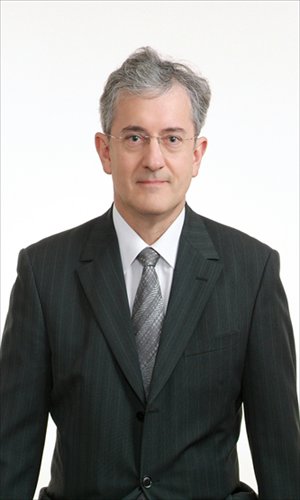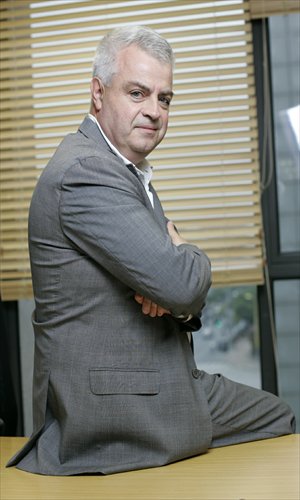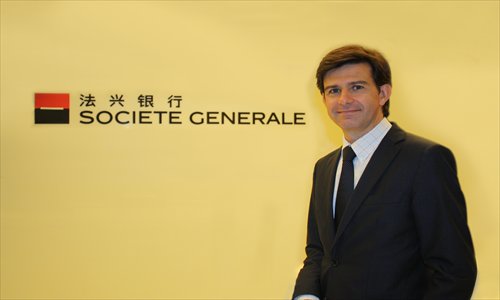Fifty years of great relations

China, France mark anniversary
Editor's Note:
January 27 marks the 50th anniversary of the establishment of the Sino-French diplomatic relations. China has changed dramatically over the past half century, especially with the dazzling rise of its economy to reach 56.9 trillion yuan ($9.3 trillion) in 2013, 156 times the size in 1978 when China initiated the reform and opening-up policy. China has become a major market for many foreign investors including French businesses. The country's new leadership has recently unveiled new reform plans to further unleash market power. On the occasion of the 50th year of Sino-French friendship, the Global Times interviewed senior executives of French companies in China, revealing their insights on the market evolution over the past years, and the emerging opportunities and challenges China's new reform blueprint will bring to them.
Major challenges seen ahead in China for foreign businesses

Olivier Guibert
The business environment is challenging for foreign companies in China as economic growth slows down, with rising labor costs and strong competition from local companies, the head of the French Chamber of Commerce in China (CCIFC) told the Global Times during a recent interview.
"One factor is related to the economic growth, the slowdown is happening already in some sectors," said Olivier Guibert, chairman of the CCIFC.
"There are concerns about human resources, including rising labor costs in a very significant manner, especially in the eastern part of China. It is getting difficult to hire the people for specific functions, make them grow, and be sure they continue working for you," Guibert noted.
2013 in China was more competitive and more challenging than ever, as few member companies reported an increase in revenues and profits compared with three or four years ago, he said.
However, it doesn't mean that China is no longer attractive, as China moves from export and investment-led growth to high-tech and a consumption-driven model, according to him.
"China is looking to develop the health, agribusiness and high-tech sectors. These industries and sectors bring more opportunities for French firms which will probably grow faster due to having some advantages," he noted.
A major concern among the member companies is the strictly regulated market.
China's reform blueprint to make market play a decisive role is "going the right direction," and "what we expect is that the economy will be much more market-driven and more accessible to public procurement," said Guibert. Rémy Autebert
Nuclear firm aims to meet energy ambition

China will become the world's largest nuclear energy user by 2030, and more than half of the world's new reactors will be built in China over the next 20 years, a senior executive of AREVA, a leading French nuclear technology provider, told the Global Times.
China is the fastest-growing energy market globally, said Rémy Autebert, senior executive vice president of AREVA Asia-Pacific.
The share of electricity from nuclear power projects in China can reach 10 percent or even more in 2030 from the current level of about 2 percent, he said.
The rapidly growing demand for electricity linked to economic growth, and air pollution caused in particular by traditional coal firing power generation will be the major motivators for China to develop clean and safe nuclear power plants, he noted.
"By 2030, the number of reactors in operation in China will account for one-third of the total number of global reactors (for electricity generation)," he said.
Currently China has 17 reactors in operation and 29 in construction, generating 1.97 percent of the country's electricity, which is much lower than France's 58 reactors producing 75 percent of the French electricity, as well as 100 reactors in the US generating 16 percent of the power.
As a leader in nuclear technology engineering, AREVA provides core technology and equipment to the nuclear power plants, including control systems, key parts, delivery of nuclear fuel, services to existing power plants and the construction of new reactors as well as engineering services to such nuclear plants.
The French energy group just celebrated its 30th anniversary of cooperation with Chinese partners CNNC (China National Nuclear Corp) and CGN (China General Nuclear Corp) in early December when the French Prime Minister Jean-Marc Ayrault visited China.
China contributes about 10 percent of AREVA global sales revenues.
China's civil nuclear industry is getting more mature after 30 years of development, as Chinese companies developed more technology over time, Autebert said.
By having the world's largest nuclear building program at home, China also has the ambition to tap into the nuclear energy export industry.
China's investment in Britain's 16 billion pounds ($26 billion) Hinkley Point project was its first foray into Europe's nuclear power market, according to media reports. Yuri Narozniak
French agriculture insurance provider to seize opportunities from rural land reform

While China may have lost the lure for some foreign insurance companies that had reportedly withdrawn due to a long cycle of investment and low prospect of profit, it is presenting market opportunities for others.
China's urbanization as well as rural reforms aimed at improving productivity of its agricultural system presented great opportunities for an agriculture insurer like Groupama, Yuri Narozniak, deputy CEO of Groupama AVIC Insurance, told the Global Times during a recent interview.
Chinese policymakers said they would further push forward the modernization of agriculture in 2014 during the Central Rural Work Conference held in December, and would allow the transfer of contracted land and encourage massive scale of farming.
Unlike French farmers who are usually rich and own large farms, Chinese farmers are generally low-income earners.
Half a century ago, Groupama, a leading French and European agriculture insurance provider, was insuring French farmers with modest premiums like it is now in China.
"Because of rural exodus, farmland ownership has consolidated into the hands of fewer, thus increasing the size of farms, allowing higher investments in machinery and productivity and thus increasing the insurance premium," he said. "China is experiencing the same evolution which European countries have experienced."
Groupama established a wholly owned company in Sichuan in 2003 and started operation in 2004. Even before that, GAN, a subsidiary of Groupama, set up a representative office in China in 1994.
During 2004-10, Groupama operated alone in Sichuan and registered accumulative losses of 188 million yuan ($30.8 million) due to heavy investment and earned low revenue due to the limited market for agriculture insurance.
"Still we had strong faith in the potential of the market. We knew we had to find our way to develop and realized that the best way to do it is to team up with Chinese partners instead of going alone," he said.
The decision to team up with Aviation Industry Corporation of China (AVIC) was taken in 2010.
The first agreement of the 50-50 joint venture was signed in November 2010 at the French Elysee Palace. The JV was formally registered in March 2012.
In April 2013, Groupama and AVIC signed a second strategic agreement witnessed by Chinese President Xi Jinping and French President Francois Hollande to double the capital of the JV to 1.1 billion yuan.
It is now the biggest foreign-funded property insurance company in China.
Headquartered in Chengdu, Southwest China's Sichuan Province, Groupama-AVIC has five branches and has hired 1,228 staff as of December 31, 2013. So far, it is the only foreign insurance company that focuses on China's rural areas.
China ranks as the fifth largest market for Groupama worldwide by premium income. "But we expect it to become No.2 soon," he said.
The insurer has expanded to Northeast China's Jilin, Liaoning and Heilongjiang provinces and Northwest China's Shaanxi Province. Olivier Boisnard
Growing market looks promising, despite challenges for French online marketing firm

As China transforms into a consumption-driven economic model with a growing population of affluent middle-class consumers, the Chinese market is increasingly promising for French brands, but how to target and reach the right customers remain challenging, Olivier Boisnard, general manager with Splio China, told the Global Times.
Splio is a wholly owned French online marketing company, which was established in China in 2009, with a focus on retail and branding developers.
"You have to understand why the Chinese want to buy," Boisnard said. What Splio does is to build a brand strategy to help customers choose a certain brand.
About 50 percent of Splio's customers are French brands including luxury cosmetic brands, and the rest are Chinese brands.
Given China's huge consumption, "retail brands are everywhere and compete like crazy," he said.
It's important to have local partners, he noted. Splio has partnerships with major B2C websites including Tmall, social media service providers including Tencent QQ, major portals sohu.com and sina.com, as well as China's three telecom operators. Stephane Torck
Fashion group aims to expand to all types of cities nationwide

With one-fifth of the world's population, China has a huge consumption power, and any business model can generate profit in this market because it is so big, Stephane Torck, CEO of Beaumanoir Group China, told the Global Times.
Beaumanoir is a French fashion group which has six brands including Cache Cache and Bonobo. It entered the Chinese market in 2005.
The company has 850 stores in 200 cities in the Chinese mainland under the Cache Cache brand, with geographic expansion from big cities like Shanghai to smaller cities.
China is a huge market and as the country is transforming its economic growth model, it brings opportunities and challenges, he noted.
The fast expansion of the French fashion group in China is greatly attributed to a solid partnership with local retailers in a form similar to franchise stores, according to Torck.
A big challenge facing the retailers in China is the surging rent costs for retailers, together with the rising labor costs, narrow the profit margin of fashion retailers that target China's mass market.
"Profit is still growing with time, yet with rising labor and rent costs, not much left," he said.
The French fashion group has a big plan to open more than 200 new outlets in China every year. Philippe Lelarge
Renminbi globalization to bring more business

The globalization of the yuan and the investing abroad strategy of Chinese firms will bring more businesses to foreign banks in China like Société Générale, the second-largest bank by market value in France, a senior executive of the bank told the Global Times.
China's financial reform toward the globalization of yuan and freer capital movement is important for foreign banks, "as it is where we bring added value to local corporates by helping them to become more internationalized," said Philippe Lelarge, CEO, Corporate Banking & Financial Institutions at Société Générale China.
Incorporated in China in 2008, the French bank just opened a branch in Harbin in Northeast China's Heilongjiang Province in 2013, focusing on the cross-border business between China and Russia.
"We are offering services in the ruble to Chinese corporates so that they can do cash management and trading activities, import and export," Lelarge said.
In December, China's State Council authorized Suifenhe at the China-Russia border as the country's first pilot zone where the Russian ruble will be allowed to be used alongside the yuan.
Société Générale also offers services to clients in African and European countries to do renminbi business.
China has transformed from a technology and investment importer to an investment exporter over recent years with the Chinese government's call for more domestic firms to invest abroad, which can be seen from the evolution of banking activities, Lelarge said.
Since 2008, with an expanded network, "we are working closely with Chinese corporates and assisting them in their going abroad strategy through different services, from basic trade finance, providing them advice and help to understand local regulations, helping them on projects of M&As, and proposing targets of acquisitions," he said.